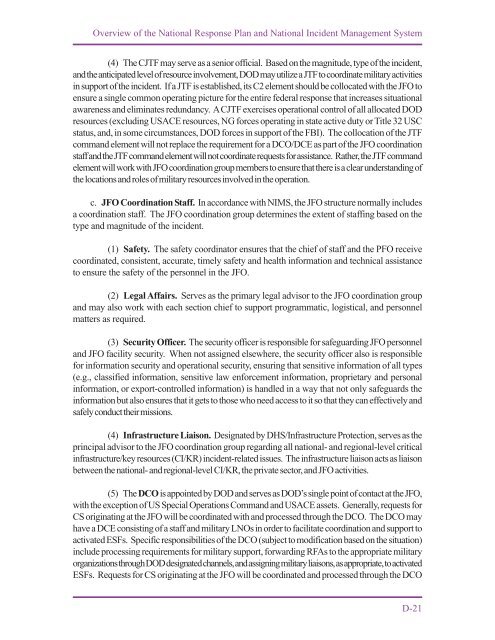JP 3-28, Civil Support - Federation of American Scientists
JP 3-28, Civil Support - Federation of American Scientists
JP 3-28, Civil Support - Federation of American Scientists
Create successful ePaper yourself
Turn your PDF publications into a flip-book with our unique Google optimized e-Paper software.
Overview <strong>of</strong> the National Response Plan and National Incident Management System<br />
(4) The CJTF may serve as a senior <strong>of</strong>ficial. Based on the magnitude, type <strong>of</strong> the incident,<br />
and the anticipated level <strong>of</strong> resource involvement, DOD may utilize a JTF to coordinate military activities<br />
in support <strong>of</strong> the incident. If a JTF is established, its C2 element should be collocated with the JFO to<br />
ensure a single common operating picture for the entire federal response that increases situational<br />
awareness and eliminates redundancy. A CJTF exercises operational control <strong>of</strong> all allocated DOD<br />
resources (excluding USACE resources, NG forces operating in state active duty or Title 32 USC<br />
status, and, in some circumstances, DOD forces in support <strong>of</strong> the FBI). The collocation <strong>of</strong> the JTF<br />
command element will not replace the requirement for a DCO/DCE as part <strong>of</strong> the JFO coordination<br />
staff and the JTF command element will not coordinate requests for assistance. Rather, the JTF command<br />
element will work with JFO coordination group members to ensure that there is a clear understanding <strong>of</strong><br />
the locations and roles <strong>of</strong> military resources involved in the operation.<br />
c. JFO Coordination Staff. In accordance with NIMS, the JFO structure normally includes<br />
a coordination staff. The JFO coordination group determines the extent <strong>of</strong> staffing based on the<br />
type and magnitude <strong>of</strong> the incident.<br />
(1) Safety. The safety coordinator ensures that the chief <strong>of</strong> staff and the PFO receive<br />
coordinated, consistent, accurate, timely safety and health information and technical assistance<br />
to ensure the safety <strong>of</strong> the personnel in the JFO.<br />
(2) Legal Affairs. Serves as the primary legal advisor to the JFO coordination group<br />
and may also work with each section chief to support programmatic, logistical, and personnel<br />
matters as required.<br />
(3) Security Officer. The security <strong>of</strong>ficer is responsible for safeguarding JFO personnel<br />
and JFO facility security. When not assigned elsewhere, the security <strong>of</strong>ficer also is responsible<br />
for information security and operational security, ensuring that sensitive information <strong>of</strong> all types<br />
(e.g., classified information, sensitive law enforcement information, proprietary and personal<br />
information, or export-controlled information) is handled in a way that not only safeguards the<br />
information but also ensures that it gets to those who need access to it so that they can effectively and<br />
safely conduct their missions.<br />
(4) Infrastructure Liaison. Designated by DHS/Infrastructure Protection, serves as the<br />
principal advisor to the JFO coordination group regarding all national- and regional-level critical<br />
infrastructure/key resources (CI/KR) incident-related issues. The infrastructure liaison acts as liaison<br />
between the national- and regional-level CI/KR, the private sector, and JFO activities.<br />
(5) The DCO is appointed by DOD and serves as DOD’s single point <strong>of</strong> contact at the JFO,<br />
with the exception <strong>of</strong> US Special Operations Command and USACE assets. Generally, requests for<br />
CS originating at the JFO will be coordinated with and processed through the DCO. The DCO may<br />
have a DCE consisting <strong>of</strong> a staff and military LNOs in order to facilitate coordination and support to<br />
activated ESFs. Specific responsibilities <strong>of</strong> the DCO (subject to modification based on the situation)<br />
include processing requirements for military support, forwarding RFAs to the appropriate military<br />
organizations through DOD designated channels, and assigning military liaisons, as appropriate, to activated<br />
ESFs. Requests for CS originating at the JFO will be coordinated and processed through the DCO<br />
D-21

















